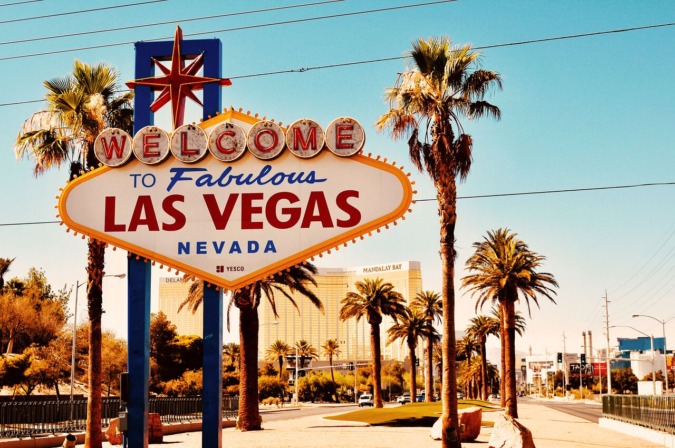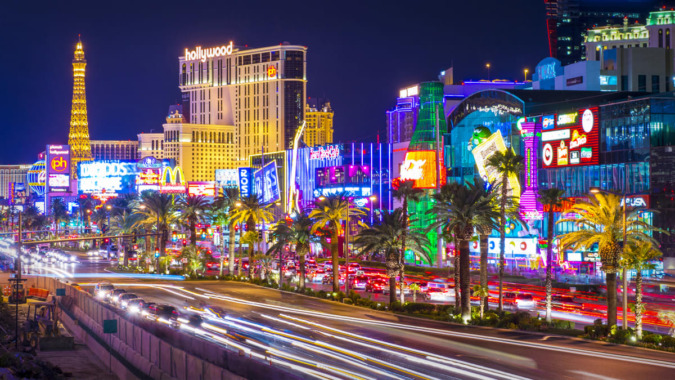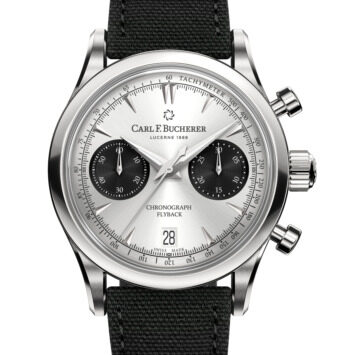
Situated within a basin amidst the Mojave Desert, the city is surrounded by arid landscapes, featuring desert vegetation and arid mountain ranges. In the Nevada desert, Las Vegas stands as a luxurious oasis, familiar with extravagant parties, glamorous surroundings, upscale resorts, and a sophisticated ‘see and be seen’ ambiance. Positioned in Clark County, southern Nevada, this city of indulgence boasts a vibrant nightlife seamlessly transitioning from dusk to dawn, accompanied by unparalleled dining choices. While the Las Vegas Strip is renowned as one of the world’s most tourist-friendly destinations, meticulous planning is crucial to avoid pitfalls.
If you’re heading to Las Vegas and uncertain about where to begin, you’ve come to the right place! The information provided here ensures a safe visit, allowing you to make the most of your time in Las Vegas.
How To Get to Las Vegas
By Air
The closest airport, McCarran International Airport, is situated 8 km south of downtown Las Vegas in Paradise.
By Road
Las Vegas is well-connected to cities within the state of Nevada and across the United States through a network of bus routes. Given the penchant for spontaneous weekend getaways, regular buses operate from numerous cities to Las Vegas. Tickets are available for purchase online, by phone, or at the terminal. Some casinos also offer discounted or free bus services to their establishments from select cities.
By Rail
While there are no direct rail services to Las Vegas, Amtrak Thruway Motorcoach provides shuttle services between major cities and the nearest Amtrak stations. Amtrak’s Southwest Chief offers a daily route from California, Albuquerque, and Los Angeles to Kingman in Arizona, located 179 km south of Las Vegas.
Best Time to Experience Las Vegas
Las Vegas maintains a consistent influx of visitors throughout the year, making it devoid of distinct high and low seasons. Nevertheless, subtle variations exist, aiding in choosing the ideal time for your visit. While travel deals are available year-round, the spring and fall shoulder seasons offer the most temperate weather in Las Vegas.
Related: 11 Wonders of Nebraska
Therefore, the prime time to explore Las Vegas is during the spring, spanning from March to May, and the fall, extending from September to November. Notably, July stands out as the hottest month with an average high of 106°F (41°C), while December marks the coldest month, featuring an average high of 58°F (14°C).

Fascinating Tidbits About Las Vegas You Probably Didn’t Know
· The Las Vegas Strip appears as the brightest spot on Earth when viewed from space.
· Stretching 4.2 miles, the Las Vegas Strip is equivalent to approximately 61,597 football fields combined.
· A segment of the Las Vegas Strip extends beyond the city limits, falling into the neighboring town of Paradise.
· While only 15% of tourists plan to gamble in Las Vegas, a surprising 71% end up engaging in gambling activities.
· Six out of the world’s ten largest hotels, based on the number of rooms, are located in Las Vegas.
Related: Life in Hong Kong
· Despite popular belief, the capital of Nevada is not Las Vegas; it is Carson City.
· The iconic “Welcome to Las Vegas” sign is not situated within the city but rather four miles outside its border.
· Before 1929, gambling in Las Vegas was prohibited, but today, there is approximately one slot machine for every eight residents.
· Known as Sin City, Las Vegas boasts an impressive 150,000 hotel rooms.
· The replica of the Great Sphinx of Giza in Sin City surpasses the size of the original.
· Las Vegas maintains a ‘black book’ containing the names of individuals banned from entering any casino in the city.
· In a daily culinary feat, people in Las Vegas consume a staggering 60,000 pounds (about 30 tons) of shrimp.
Related: 10 Best Restaurants in Canada
· The captivating fountains at the Bellagio utilize “gray water,” signifying previously used but untreated water.
· Las Vegas casinos intentionally lack clocks and windows, making it easy for visitors to lose track of time.
· Interestingly, most casinos in Las Vegas omit the 4th floor, as the number four is deemed more unlucky than thirteen.
· Contrary to its reputation, Las Vegas offers surprising family-friendly attractions, proving to be more than just a destination for adults.
What Makes Las Vegas Distinct? Beyond its reputation for glamour and glitz, Las Vegas offers a diverse array of natural and cultural attractions that can enhance your travel itinerary.
Natural Attractions in Las Vegas:
Lake Mead
Situated on the Colorado River, just southeast of Las Vegas, Lake Mead is the largest reservoir in the United States in terms of water capacity. This man-made lake invites visitors to experience a delightful time in Las Vegas.
Hoover Dam
Formerly known as Boulder Dam, this concrete arch-gravity dam was built between 1931 and 1936. Nestled in the Black Canyon of the Colorado River, on the border between Nevada and Arizona, Hoover Dam is a mere 30 miles southeast of Las Vegas.
Related: Best Towns To Visit In Eastern Europe
Mount Charleston
Located 35 miles northwest of Las Vegas, Mount Charleston is part of the Spring Mountain Range and Toiyabe National Forest. With elevations ranging from 3,000 to 12,000 feet, it is Nevada’s eighth-highest mountain peak, offering opportunities for hiking, camping, sightseeing, and winter sports activities.
Red Rock Canyon
National Conservation Area Situated in Nevada’s Mojave Desert, Red Rock Canyon National Conservation Area lies just 15–20 miles from Las Vegas. Renowned for its geological features, including towering red sandstone peaks, the Keystone Thrust Fault, and Native American petroglyphs, it provides a captivating natural experience.
Related: 10 Exciting Things to Do in Toronto Over the Weekend
Death Valley National Park
Recognized as America’s lowest, hottest, and driest national park, Death Valley National Park spans eastern California and Nevada. A convenient two-hour drive from the Strip (approximately 130 miles), it offers a unique desert landscape.
Zion National Park
Embrace vibrant landscapes by visiting Zion National Park, located in Utah, approximately two and a half hours from Las Vegas. Known for its distinctive geological features and diverse flora and fauna, it serves as an ideal destination for a day trip.
Bryce Canyon National Park
Close to Zion National Park, Bryce Canyon National Park boasts crimson-colored hoodoos, spire-shaped rock formations. Positioned about four hours northeast of Las Vegas, it promises a visually stunning and memorable experience.
Cultural Gems in Las Vegas:
Bellagio Gallery of Fine Art
Delve into the sophisticated side of Las Vegas at the Bellagio Gallery of Fine Art, showcasing an exceptional collection gathered from private collections and museums worldwide. Immerse yourself in a delightful cultural experience during your visit to Las Vegas.
Smith Center for the Performing Arts
Nestled in Downtown Las Vegas’ 61-acre Symphony Park, the Smith Center for the Performing Arts is a five-acre cultural hub featuring both visiting art installations and commissioned pieces by local and international artists. It offers a diverse and enriching experience in the heart of the city.
Neon Museum Boneyard
Established in 1996, the Neon Museum is a non-profit organization committed to collecting, preserving, studying, and exhibiting iconic Las Vegas signs for educational, historic, and cultural enrichment. A visit to this museum is a captivating way to spend your time in Las Vegas.
The Mob Museum
A non-profit organization with a mission to deepen public understanding of organized crime’s history and impact on American society, The Mob Museum is located in Downtown Las Vegas. This history museum presents an authentic view of organized crime, spanning from vintage Las Vegas to the back alleys of American cities and beyond borders.
The National Atomic Testing Museum
Situated in Las Vegas, The National Atomic Testing Museum documents the history of nuclear testing at the Nevada Test Site in the desert north of the city. The museum showcases artifacts from the Nevada Test Site through interactive modules, timelines, films, and genuine equipment and gadgets.
Pinball Hall of Fame
Opened just a decade ago, the Pinball Hall of Fame is a museum dedicated to pinball machines. Conceived by members of the Las Vegas Pinball Collectors Club, it aims to house and display the world’s largest pinball collection to the public. The museum features over 200 different pinball games, including classic video arcade games and novelty machines from the past and present.
Essentials for Your Las Vegas Adventure:
– Comfortable walking shoes for exploring the vibrant city.
– Toiletries including a toothbrush, toothpaste, deodorant, body cream, lip balm, and perfume.
– A pair of flip-flops or sandals, essential for poolside relaxation.
– A light jacket or sweater to shield against the brisk air conditioning.
– Sunscreen, sunglasses, and a hat to safeguard against the desert sun.
– A valid ID card for entry into casinos, bars, and nightclubs.
– Casual and stylish day outfits tailored to your itinerary.
– Don’t forget your bathing suits for the myriad summer pool parties.
– Necessary medications and a compact first aid kit.
– Camera and phone to capture all the memorable moments.
Prepare for an unforgettable Las Vegas experience with these essentials! The city, renowned for its wealth, dazzling lights, gambling, libations, luxury cars, and celebrity allure, eagerly awaits your exploration.
Share your travel tales beyond the famous Strip in the comments below!
FAQ
1. What makes Las Vegas a popular tourist destination?
Las Vegas is renowned for its vibrant entertainment, world-class resorts, lively nightlife, and iconic attractions. The city’s allure lies in its diverse entertainment options, luxurious accommodations, and the famous Las Vegas Strip.
2. When is the best time to visit Las Vegas?
While Las Vegas attracts visitors year-round, the spring (March to May) and fall (September to November) offer the most moderate weather. These shoulder seasons provide optimal conditions for exploring the city comfortably.
3. How do I get to Las Vegas?
Las Vegas is easily accessible by air, road, and rail. McCarran International Airport serves as the primary air gateway, and the city is well-connected to other cities in Nevada and beyond via bus routes. While there are no direct rail services, Amtrak Thruway Motorcoach provides shuttle services.
4. What are the must-visit natural attractions in and around Las Vegas?
Some natural gems include Lake Mead, Hoover Dam, Mount Charleston, Red Rock Canyon National Conservation Area, Death Valley National Park, Zion National Park, and Bryce Canyon National Park.
5. What cultural attractions does Las Vegas offer?
Cultural highlights include the Bellagio Gallery of Fine Art, Smith Center for the Performing Arts, Neon Museum Boneyard, The Mob Museum, The National Atomic Testing Museum, and the Pinball Hall of Fame.
6. Is Las Vegas family-friendly?
Contrary to its reputation, Las Vegas has evolved into a family-friendly destination with numerous attractions suitable for all ages, including shows, museums, and outdoor activities.
7. What should I pack for a trip to Las Vegas?
Essentials include comfortable walking shoes, toiletries, pool wear, a light jacket for cool indoor spaces, sunscreen, sunglasses, a hat, a valid ID for entry into venues, casual day outfits, bathing suits, necessary medications, and a camera or phone for capturing memories.
8. Are there any interesting facts about Las Vegas that are not commonly known?
Indeed! For example, the Las Vegas Strip is visible from space as the brightest spot on Earth, and only 15% of tourists plan to gamble, yet 71% end up doing so. Also, the famous “Welcome to Las Vegas” sign is located four miles outside the city limits.
9. What is the legal age for gambling and drinking in Las Vegas?
The legal age for both gambling and drinking in Las Vegas is 21. Engaging in either activity while underage can lead to legal consequences.
10. Are there family-friendly accommodations in Las Vegas?
Yes, many resorts in Las Vegas offer family-friendly amenities, including entertainment shows suitable for all ages, kid-friendly pools, and activities designed for families.
11. How much do you tip for free drinks in Vegas?
For those who serve free drinks to casino players, a tip of $1 to $2 is considered good enough.
12. What neighborhoods should you avoid in Las Vegas?
Stay off the East side of Las Vegas (Boulder Hwy and Nellis Blvd). These places can put you in trouble in a matter of seconds.
Related posts:
- How to Cross the Indian Roads: Navigating the Chaos with Caution
- Create a Motivating Workspace for Yourself
- Uttar Pradesh – Home Of Shree Ram, Shree Krishna & Mahadev
- Andhra Pradesh – Abode Of Venkateshwara, Mallikarjuna & Shakti
- 5 Differences Between South and North India
- Top Four Beaches in Phuket, Thailand
What's Your Reaction?
One of my friends once said, I am in love with words and a zoned out poser... well, I will keep it the way it has been said! Besides that you can call me a compulsive poet, wanna-be painter and an amateur photographer





